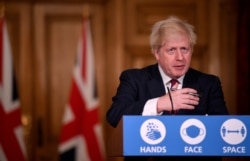British Prime Minister Boris Johnson will lead a meeting Monday of the country’s crisis committee to address travel in and out of Britain, especially the movement of freight.
On Sunday, several countries in Europe and the Middle East banned air travel from Britain because of concerns over a mutant strain of the coronavirus that has been spreading rapidly in England this month.
However, France barred all travel, including movement of all freight carriers, for 48 hours, starting Sunday night. That shut down the tunnel under the English Channel, through which pass thousands of trucks a day, and the Port of Dover, which also closed its ferry terminal. Dover is one of Britain’s busiest ports, which has seen extra traffic ahead of Brexit. Britain is to leave the EU in less than two weeks and is so far without a deal.
Ireland, Italy, Austria, Belgium and the Netherlands also banned flights from Britain over the new coronavirus variant. Canada, Kuwait, Saudi Arabia and Israel followed suit. Other countries were considering a flight ban as the European Union met to discuss what to recommend.
The strain has turned up outside of Britain. Italy’s foreign minister said Sunday that a case has been identified in Rome. And the World Health Organization said nine cases have been detected in Denmark and one each in the Netherlands and Australia.
The new variant is 70% more transmissible, Johnson said, but government scientists say they can’t guarantee the new strain won’t affect the effectiveness of vaccines and are working establish what the impact may be.
Vivek Murthy, U.S. President-elect Joe Biden’s nominee for U.S. surgeon general, said Sunday there is no change to the public health guidance: wear masks, social distance and wash hands.
“While it seems to be more easily transmissible, we do not have evidence yet that this is a more deadly virus to an individual who acquires it,” Murthy said on NBC’s “Meet the Press.” “There’s no reason to believe that the vaccines that have been developed will not be effective against this virus, as well.”
The strain was confirmed on December 13 in the county of Kent in southern England, and initial analysis by government scientists suggests it is “growing faster than the existing variants.”
The variant was initially found in a patient in September. Genome sequencing, which took nearly a month, indicated it was a new strain, but government scientists weren’t too worried as mutations come and go. But as infections continued to surge in November and December, government scientists realized they were dealing with a more transmissible version of the virus.
Speaking to Sky News Sunday, Britain Health Minister Matt Hancock said the new strain is out of control and urged Britons to behave as if they already have the virus, especially in London, and southern and eastern England.
“It [the new strain] is an enormous challenge, until we can get the vaccine rolled out to protect people,” he said. “This is what we face over the next couple of months.”
London, southeast England locked down
On Saturday, Johnson announced a virtual lockdown for London and the southeast of England. People were to stay at home and nonessential stores to close. Amid the new directives, police deployed to London railway stations filled with people trying to leave the city.
“We can’t continue with Christmas as planned,” Johnson said, noting that a previously announced relaxation of rules for the holidays would be reversed. In London and southern England, households now can’t mix to celebrate Christmas. Elsewhere in the country, up to three households can mix but only for Christmas Day itself.
England’s chief medical officer, Chris Whitty, said Britain has alerted the World Health Organization about the fast transmissibility of the variant strain.
“There is no current evidence to suggest the new strain causes a higher mortality rate or that it affects vaccines and treatments, although urgent work is under way to confirm this,” he said in a statement.
Jeremy Farrar, a government adviser and director of the Wellcome Trust, Britain's largest medical research endowment, warned Saturday of his concern. He tweeted: “The new strain of COVID-19 is worrying & real cause for concern & extra caution. Research is ongoing to understand more but acting urgently now is critical. There is no part of the UK & globally that should not be concerned. As in many countries, the situation is fragile.”
The new strain of Covid-19 is worrying & real cause for concern & extra caution. Research is ongoing to understand more, but acting urgently now is critical. There is no part of the UK & globally that should not be concerned. As in many countries, the situation is fragile.
— Jeremy Farrar (@JeremyFarrar) December 19, 2020
The new variant includes up to 23 changes, including with the spike protein, which the virus uses to enter human cells that allow it to replicate. There have been many mutations in the virus since it emerged last year in Wuhan, China, with 4,000 mutations in the protein alone. Virologists say most mutations are insignificant and part of the expected evolution of the virus, but some may lead to more efficient transmission.
According to the government’s scientific advisers, the new strain is fast becoming the dominant strain.
Government scientists say it could take two weeks for scientists to establish how the new strain reacts to vaccines, but virologists are hoping that the changes won’t diminish the efficacy of vaccines, which are designed to produce antibodies against many different parts of the spike protein.
Hospitals in England are seeing a record number of patients suffering from COVID-19, the disease triggered by the coronavirus. About 38 million people in England were under tough coronavirus restrictions before Saturday’s announcement. The new measures amount to a virtual lockdown, something Johnson had said just a few days ago he would do everything to avoid.






